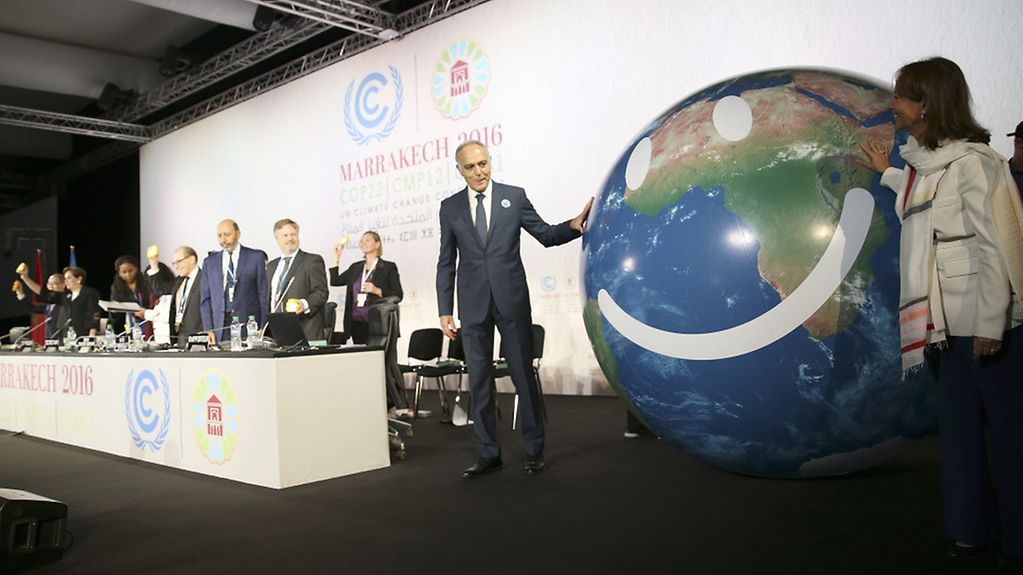UN Climate Change Conference in Marrakesh
The international community is meeting in Morocco to discuss the implementation of the climate goals agreed in Paris. It is primarily a question of how poor countries can be given support to help them adjust to climate change. Federal Environment Minister Barbara Hendricks will be attending the conference as of 14 November.
3 min reading time

How can global greenhouse gas emissions be significantly reduced? That is one of the key issues at the Climate Change Conference
Photo: picture alliance/AP Photo/Mosa'ab Elshamy
"We must not rest on our laurels, now that the Paris Agreement has come into effect swiftly, because the real work is just beginning," stressed Federal Environment Minister Barbara Hendricks at the start of the United Nations Conference on Climate Change in Marrakesh. The conference, known as COP (Conference of the Parties) 22, will run from 7 to 18 November.
Climate action goals must be specific and verifiable
On 4 November 2016 the Paris Agreement officially came into effect – earlier than expected. And now the parties face some extremely hard work. It must be negotiated at international level how greenhouse gas emissions can be dramatically reduced, in an effort to keep global warming well below 2° Celsius.
The individual parties are instrumental in global warming to very different degrees. By signing the Paris Agreement they entered into a voluntary commitment to draw up national climate action plans. In Marrakesh the international community must now devise common indicators for taking global stock in 2018.
Preliminary work was already done in May 2016, when the 195 UN member states met in Bonn at working level to discuss the technical form and the translation of the provisions of the Paris Agreement into detailed regulations. They considered which data the countries must deliver in order to put in place a system that is globally transparent.
The target - 2030
In Marrakesh a road map must be produced. Every country must provide evidence of its achievements in the field of climate action, and propose ways of accelerating progress. By 2018, the regulations must be finalised. On this basis, every state is to submit its own national climate action plan by 2020.
Every five years the goals will be reviewed – and more ambitious goals must be drawn up. The regulations will help ensure transparency and verifiability.
The European Union has a relatively simple yet ambitious target. By 2030 it aims to cut emissions of greenhouse gases by at least 40 per cent of the 1990 level. Nobody would claim that this will be easy. Politicians must "now send a clear signal to the private sector, civil society and investors around the world," demanded Barbara Hendricks. Today we must set the scene for ending the use of fossil fuels and shifting to innovative technologies, if we seriously intend to achieve the goals set for 2030.
Assistance for the poorer countries
Developing countries and emerging economies are suffering particularly under extreme weather events: years of drought and weeks of extreme rainfall with flooding wipe out harvests. The people starve – climate change is a root cause of migration.
The Paris Agreement thus stipulates that the industrialised nations are to support the countries worst hit by global warming. From 2020 to 2025 the rich countries are to provide a sum of 100 billion dollars every year. In Marrakesh, participants are discussing how this sum can be raised and which industrialised state should pay how much.
In this way they can help poorer states adjust to climate change. About 200 nations agreed in December 2015 to the Paris Agreement. Of these states "it is estimated that about 140 had never previously had anything like a climate action plan," said Barbara Hendricks, describing the situation.
Germany is also advocating a global partnership for implementation. What this really means is that Germany is willing to share its experience in the field of climate change mitigation with other states who are only just starting out along this road. In these countries, contact points should be established, where people can obtain information on various aspects of green power, agriculture, traffic and transport and urban planning. The German Federal Environment Ministry and the Federal Ministry for Economic Cooperation and Development will support these efforts.